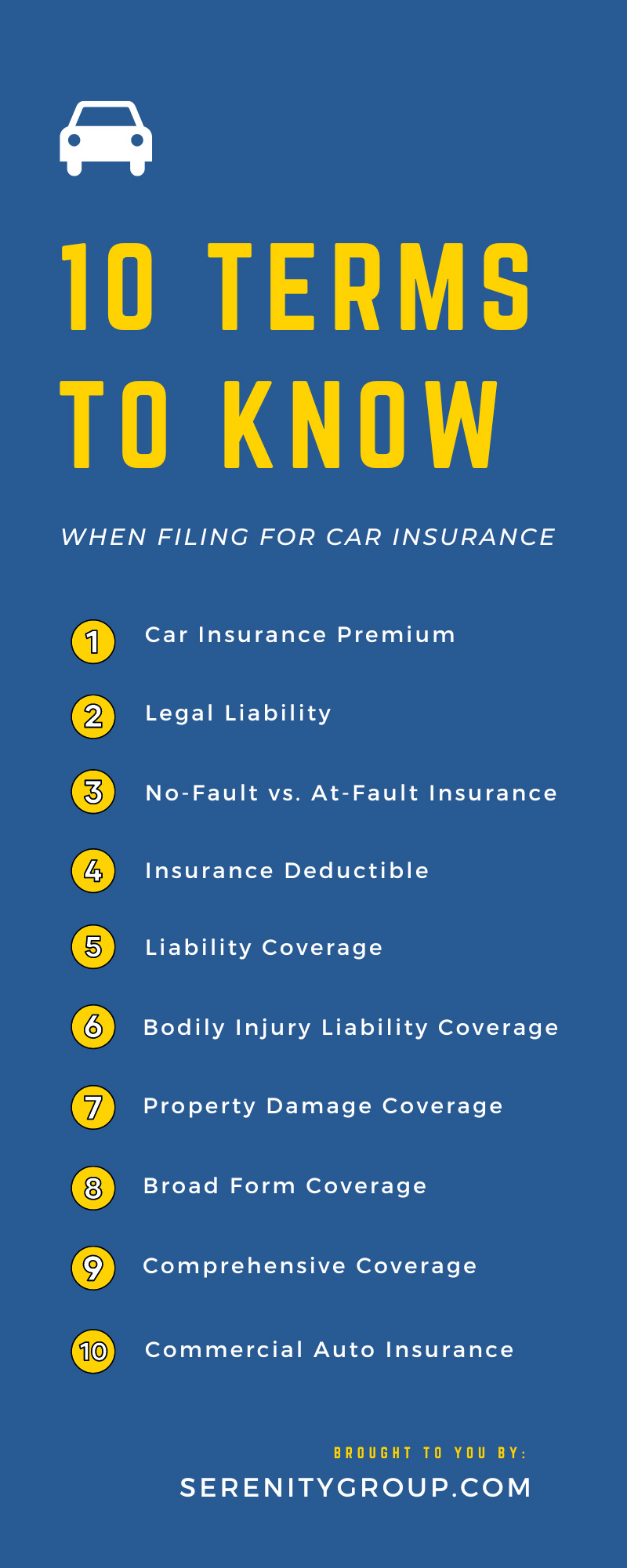10 Terms To Know When Filing for Car Insurance

Car insurance is a vital part of owning a vehicle, as you can’t legally drive without the proper insurance. You need to find a provider who will cover you and your vehicles before you head out on the road. However, finding a good insurance policy isn’t easy, and you’ll need to understand the basics to know that you’re getting the insurance you need. Here are the terms you’ll want to know when filing for car insurance.
The Basics
These first terms focus on understanding the basics of car insurance. While you can use your knowledge of other insurance to help understand car insurance, these terms are unique or apply differently in the context of car insurance.
Car Insurance Premium
When shopping around for car insurance, you’ll hear much talk about premiums. This is the monthly payment you’ll owe to the company for covering you and your vehicle. This amount varies greatly depending on your chosen policy and what the company offers you. Ideally, you want to keep this low while getting all the coverage you need from your insurance policy.
Legal Liability
Liability is a legal term referring to who’s responsible for an incident. Whenever there’s an accident, your provider will likely require a report on who was responsible for the incident, as that person’s insurance is the one that needs to pay for the incident. Liability is very important for insurance as it’ll determine who’s paying for what if you ever need to make a claim.
No-Fault vs. At-Fault Insurance
A critical factor of vehicle insurance is if you live in a place that uses no-fault or at-fault insurance. These relate to liability and how much it matters for your insurance. Currently, The standard is at-fault insurance, which means that each company involved tries to find the party liable for the incident before paying out. No-fault insurance ignores the idea of liability and has each company split the costs when covering an incident. This changes depending on what state you’re in.
Insurance Deductible
One factor that confuses many people about insurance is a policy’s deductible. If your policy has a deductible, you pay up to that amount before insurance starts covering the rest. For example, if you get in an accident and need to pay $5,000, but your insurance policy has a $1,000 deductible, you’ll pay up to your deductible, and then your insurance provider will step in. This is important as you’re responsible for paying for anything less than the deductible, but having a high deductible means you pay less for your premium.
Types of Coverage
When looking for the best insurance for you, understanding the types of coverage out there is the most important. There are so many types of coverage with entirely different benefits and purposes; you’ll want to know how to differentiate them so that you can choose the right one. Here’s a look at some of the most common types of coverage for cars.
Liability Coverage
Liability coverage is a very simple type of insurance and can be a part of many different policies. Liability coverage is any type of insurance that helps pay for any costs the policyholder may accrue because they’re found liable for an accident or incident. The exact amount depends on your policy and your deductible, but this is coverage you’ll need when driving on the road.
Bodily Injury Liability Coverage
Regarding liability coverage, bodily injury liability coverage is a special subset of this insurance. Specifically, this coverage helps pay for any medical costs for others, you, and anyone in your vehicle that you’re found liable for after an accident or incident in your car. Without this coverage, you would likely need to pay the full medical expenses if you’re found liable.
Property Damage Coverage
While bodily injury liability coverage focuses on medical costs, property damage coverage focuses on covering the cost of property or anything that isn’t an injury resulting from an incident. This can help cover your vehicle and the vehicles of anyone else in the incident. In most cases, you’ll need both types of insurance in your policy to legally drive on the road.
Broad Form Coverage
Broad form coverage is a unique type that focuses on covering more than just the basics you need according to the law. This insurance coverage helps in rare circumstances like burglary and damage outside of an accident. Broad form auto insurance usually costs more as it protects more, but it’s worth it the more expensive your vehicle is.
Comprehensive Coverage
Like broad form coverage, this coverage covers your vehicle outside the legal minimum. Comprehensive coverage, which may still have a deductible, will cover all incidents in regard to your vehicle, even if they aren’t explicitly named in the policy. This is similar to broad form coverage, except broad form only covers things it names specifically.
Commercial Auto Insurance
While most individuals need auto insurance that just covers their vehicle, businesses need a different type of insurance. Commercial auto insurance is necessary for businesses that utilize cars for the job. This won’t benefit individuals, but it’s required for any business with at least one work vehicle.
Choosing the Right Insurance
Determining what you need for your insurance can be challenging, but knowing these terms will help you pick the right one for you. When it comes to searching for your insurance, there are some things you need to do first. Find out your state requirements, as every state has a minimum requirement for your insurance that you need to meet. Determine what coverage you need for your vehicle. Some people need broad form insurance while others just want the bare minimum. Finally, don’t just go with the first offer; shop around and ask different places for various quotes and potential policies, as you may find a better price or deal by comparison shopping.
Insurance is complex, but once you get the hang of the terminology, you can get precisely what you need. Soon you’ll have the insurance you need and the proper protection for your vehicle to drive legally and cover you if something happens when you’re on the road.


Recent Comments